
Revista Uruguaya de Historia Economica
Scope & Guideline
Uncovering the Historical Threads of Economic Policy
Introduction
Aims and Scopes
- Economic History Analysis:
The journal emphasizes the historical analysis of economic systems, policies, and practices across Latin America, offering insights into how historical events shape current economic conditions. - Regional Economic Development:
A core focus is on the regional dimensions of economic development, particularly as they relate to Uruguay's historical context and its interactions with neighboring countries. - Interdisciplinary Approaches:
The journal employs interdisciplinary methodologies, integrating perspectives from social history, political science, and economics to provide a comprehensive view of economic phenomena. - Labor and Gender Studies:
There is a consistent interest in labor dynamics, including the role of gender in economic participation and the historical implications of labor policies. - Public Policy and State Development:
The journal explores the role of state power and public policies in shaping economic conditions, particularly through the lens of historical institutional development.
Trending and Emerging
- Impact of Gender on Economic Participation:
There is an increasing focus on how gender dynamics influence labor force participation and economic policies, reflecting broader societal changes and the relevance of gender studies in economic history. - Infrastructure and Economic Development:
Emerging themes around infrastructure development, particularly in relation to transportation and energy policies, indicate a growing interest in how these factors contribute to economic growth. - Historical Analysis of Public Policies:
Recent papers have shown a trend toward in-depth historical analyses of public policies and their long-term impacts on economic structures, suggesting a renewed interest in the role of the state. - Environmental Resources and Economic Outcomes:
There is a rising emphasis on the relationship between natural resources and economic divergence, indicating a growing awareness of environmental factors in economic history. - Educational Development and Economic Growth:
The origins and impacts of educational systems on economic development, particularly in Latin America, have gained traction, reflecting a recognition of education as a key driver of economic progress.
Declining or Waning
- International Financial Crises:
There has been a noticeable reduction in publications specifically addressing international financial crises and their historical contexts, suggesting a waning interest or a shift towards more localized studies. - Colonial Economic Structures:
Research focusing on colonial economic structures and their direct impacts seems to be less prevalent, indicating a possible transition towards modern economic histories rather than colonial legacies. - Economic Theories and Models:
The journal has published fewer papers that engage deeply with economic theories or models, indicating a potential shift towards empirical studies and historical narratives rather than theoretical explorations. - Comparative Economic Studies:
Comparative analyses of different national economies appear to be declining, which may suggest a narrowing focus on specific national contexts rather than broader regional comparisons.
Similar Journals
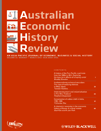
AUSTRALIAN ECONOMIC HISTORY REVIEW
Innovative Research, Illuminating Economic Histories.The Australian Economic History Review, published by Wiley, is a premier journal dedicated to advancing the field of economic history through rigorous research and insightful analyses. With an ISSN of 0004-8992 and an E-ISSN of 1467-8446, this journal has established itself as a critical resource for scholars and practitioners alike, with a notable Scopus ranking that places it in the 85th percentile among History journals and provides a complementary perspective in Economics and Econometrics fields. Since its inception in 1974, it has provided a platform for innovative research, fostering discussions that span Australian economic developments and their global contexts. Although it offers limited Open Access options, the journal remains a vital source of information for those seeking to understand the intricate dynamics of economic processes through historical lenses. Researchers, professionals, and students are encouraged to engage with the rich content that contributes significantly to both academic scholarship and practical implications in economic historiography.
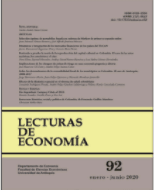
Lecturas de Economia
Advancing Economic Discourse in ColombiaLecturas de Economia is an esteemed Colombian academic journal published by UNIV ANTIOQUIA, FAC CIENCIAS ECONOMICAS, focusing on the multifaceted fields of Economics, Business Management, and Social Sciences. Since its inception in 2005, the journal has transitioned to an Open Access format in 2010, thereby enhancing accessibility to a broader audience and fostering the dissemination of research findings. With ISSN 0120-2596 and E-ISSN 2323-0622, the journal is indexed in Scopus and currently holds various Q4 quartile rankings across categories such as Business, Management, Finance, and Sociology, reflecting its growing impact within the academic community, despite its current H-index not being specified. The journal aims to promote rigorous scholarly work, stimulating discussions around economic theories and practices while contributing to the development of innovative solutions for modern challenges. Located in Medellin, Colombia, it serves as a platform for researchers, professionals, and students alike to engage with cutting-edge developments in economics and related fields.

Historia Unisinos
Exploring the Depths of Historical NarrativesHistoria Unisinos, published by the UNIV DO VALE DO RIO DOS SINOS in Brazil, is a prominent academic journal dedicated to the field of history. With an ISSN of 1519-3861 and E-ISSN 2236-1782, this journal has established itself as a key resource for researchers, professionals, and students alike, providing a platform for high-quality research and scholarly discourse. In the 2023 rankings, it has been categorized in the Q3 quartile within the history domain and stands at #1162/1760 in Scopus's Arts and Humanities rankings, placing it in the 33rd percentile. Spanning from 2010 to 2023, the journal emphasizes innovative historical scholarship, critical analysis, and interdisciplinary approaches, fostering a deeper understanding of historical narratives and contexts. As an academic outlet, it serves both local and international communities, promoting the exchange of ideas and research findings that contribute significantly to the field of history.
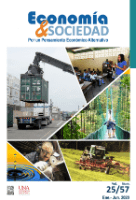
Revista Economia y Sociedad
Exploring Contemporary Issues in Economics and Society.Revista Economia y Sociedad is a distinguished peer-reviewed journal published by UNIV NACL, EDITORIAL, based in Costa Rica. Since its inception in 1996, this Open Access journal has become a vital platform for the dissemination of research and scholarship in the fields of economics and social sciences. With a commitment to promoting free access to high-quality academic content, the journal facilitates the sharing of knowledge among researchers, professionals, and students globally. Though the journal does not have a formal impact factor or H-index ranking, its influential contributions continue to shape discussions and innovations in economic policy, societal trends, and sustainable development. Researchers and academics are encouraged to submit original articles, reviews, and empirical studies that engage with contemporary economic issues, providing insights that pave the way for future inquiries in this dynamic field.

Estudios de Historia Moderna y Contemporanea de Mexico
Connecting Scholars through Open Access to Mexico's Historical InsightsEstudios de Historia Moderna y Contemporanea de Mexico, published by the UNAM, INST INVESTIGACIONES HISTORICAS, serves as a vital resource for scholars and enthusiasts in the fields of modern and contemporary Mexican history. With an ISSN of 0185-2620 and E-ISSN of 2448-5004, this journal has been Open Access since 2010, ensuring that researchers, professionals, and students can freely access a wealth of knowledge without barriers. Situated in Mexico and operating from CIUDAD UNIV, the journal offers insight into significant historical narratives spanning from 2009 to 2024. Ranked in the Q3 category for history in 2023 and positioned at Rank #1177/1760 in Scopus, it provides a unique platform to explore diverse historical perspectives, making it a crucial publication for advancing research within its academic community.
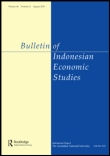
BULLETIN OF INDONESIAN ECONOMIC STUDIES
Advancing Insights into Indonesia's Economic LandscapeBULLETIN OF INDONESIAN ECONOMIC STUDIES (ISSN: 0007-4918; E-ISSN: 1472-7234) is an esteemed journal published by Routledge Journals, Taylor & Francis Ltd, based in the United Kingdom. Since its inception in 1965, this journal has played a pivotal role in advancing the understanding of economic development within Indonesia and the wider Southeast Asian region. With an impressive impact, it holds a Q1 ranking in both Development and Economics and Econometrics categories for 2023, reflecting its influential contributions to the field. The journal is highly regarded for featuring empirical research, theoretical analyses, and policy discussions, consistently ranking among the top publications in social sciences and economics—placing it in the 92nd and 90th percentiles respectively. As a vital resource for researchers, professionals, and students, the BULLETIN OF INDONESIAN ECONOMIC STUDIES provides invaluable insights into economic issues, making it essential for those aiming to grasp the complexities of economic systems in Indonesia and beyond.

Cimexus
Unearthing the Complexities of Our PastCimexus is a distinguished academic journal published by the Instituto de Investigaciones Históricas at Universidad Michoacana de San Nicolás de Hidalgo, focusing on the rich field of historical and cultural studies. With the ISSN 1870-6479 and E-ISSN 2007-9206, Cimexus has been an Open Access publication since 2006, promoting unrestricted dissemination of research to enhance collaboration and innovation. Situated in Morelia, Michoacán, Mexico, this journal serves as a vital platform for scholars and researchers dedicated to exploring the complexities of history and culture, thereby making significant contributions to the academic community. Through rigorous peer review and a commitment to high-quality research, Cimexus seeks to foster impactful discourse and provide visibility to pioneering studies in historical inquiry, encouraging engagement among professionals, researchers, and students alike.
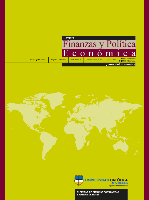
Revista Finanzas y Politica Economica
Empowering Financial Insights and Economic DialogueRevista Finanzas y Política Económica, published by UNIV CATOLICA COLOMBIA, FAC ECONOMIA, stands as a pivotal open-access platform since 2007 for scholars and practitioners in the fields of finance and economics. With an ISSN of 2248-6046 and an E-ISSN of 2011-7663, this journal is a vital resource for those looking to explore contemporary financial theories, economic policies, and their practical implications in Latin America and beyond. The journal is categorized in the fourth quartile in both Economics and Econometrics and Finance as of 2023, reflecting its growing significance in the academic community, despite its current Scopus rankings in lower percentiles. Situated in Bogotá, Colombia, at AV CARACAS 46-72, this publication facilitates the exchange of innovative ideas while supporting open access initiatives, ensuring researchers, students, and professionals have free entry to cutting-edge knowledge in these disciplines. The journal's commitment to fostering scholarly communication is evident in its converging years from 2015 to 2024, allowing for a dynamic dialogue on evolving financial and economic trends.
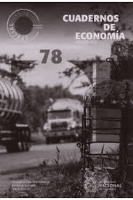
Cuadernos de Economia
Catalyzing scholarly dialogue for a sustainable future.Cuadernos de Economia, published by UNIV NAC COLOMBIA, FAC CIENCIAS ECONOMICAS, CUADERNOS ECONOMIA, stands as an open access journal dedicated to advancing the discourse in the fields of Economics, Arts and Humanities, and Social Sciences. With its ISSN 0121-4772 and E-ISSN 2248-4337, this journal has been openly accessible since 2001, facilitating the dissemination of research from diverse socioeconomic contexts, particularly in Latin America. The journal is recognized in various Scopus ranks, with notable inclusions within Q3 and Q4 quartiles for 2023, reflecting its commitment to quality scholarly publishing. Operating out of Bogotá, Colombia, Cuadernos de Economia serves as a vital resource for researchers, professionals, and students seeking to explore innovative economic solutions and multifaceted social dynamics. Through its publication, the journal aims to foster academic exchange and support the development of new ideas in the ever-evolving landscape of economics and society.

Revista de Historia Industrial
Charting the Course of Industrial NarrativesRevista de Historia Industrial, published by UNIV BARCELONA, DEPT HISTORIA, INST ECONOMIQUES, is a premier journal dedicated to the field of industrial history. With a proud ISSN of 1132-7200 and E-ISSN 2385-3247, this esteemed publication has been instrumental in shaping scholarly discourse since its inception in 1996, notably covering a wide array of topics related to industrial development, economic transitions, and historical methodologies through its issues published from 2011 to 2024. Distinguished by its Q1 ranking in History and its influence reflected in a 73rd percentile position among arts and humanities journals, the journal facilitates access to valuable insights for researchers, professionals, and students alike. While it is not an open access journal, its commitment to rigorous academic standards and insightful analyses ensures its relevance in the ever-evolving field of industrial history, providing an essential platform for the exchange of knowledge and innovative research. The journal's multi-faceted scope also intersects with the history and philosophy of science, making it a vital resource for interdisciplinary studies as well.